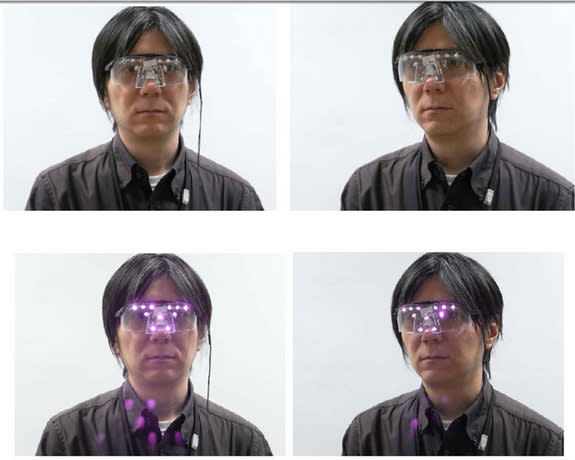Privacy Visor Blocks Facial Recognition Tech

Growing swarms of facial recognition software can identify people whose faces end up in pictures posted online without their permission. But a new "privacy visor" aims to beat such software by using a dazzling light display to restore a sense of privacy.
The wearable technology takes privacy measures a step beyond the baseball cap and sunglasses worn by celebrities, or even the asymmetrical face paint and hairstyles proposed by a Web designer studying art at New York University. Instead, it embeds LED lighting inside a pair of commercially available goggles to confuse facial recognition software with dazzling near-infrared light "noise."
Any such "noise" changes the software's perception of a person's features to effectively prevent accurate facial recognition, according to Japanese researchers. But the LED lighting does not interfere with the normal vision of the human user.
The Japanese team anticipates its technology could become popular as the growing use of "augmented reality" technology — such as the futuristic Google glasses — threatens to chip away even more individual privacy. Augmented reality software could theoretically display a person's identity and known background information for a Google glasses wearer after it manages to identify the person through facial recognition.
Even brick-and-mortar retail stores could begin rolling out facial recognition technology in greater numbers to identify customers and their preferences. That might lead to a cringeworthy "Minority Report" experience of having flashy video ads shouting people's names as they walk by.
The privacy visor could already protect people against being identified unwillingly through pictures shared on Facebook or other social networks. A press release has more details on the work done by Isao Echizen, an associate professor at the National Institute of Informatics in Tokyo, and Seiichi Gohshi, a professor at Kogakuin University in Tokyo.
A downside of the privacy visor comes from its need for power — a distinct disadvantage compared with simpler forms of obscuring faces, such as the baseball cap and sunglasses.
Such privacy protection also comes at the fashion cost of resembling a geeky "Tron" fan and possibly raising the curiosity of both bystanders and law enforcement officers. But that may beat the face paint approach of looking like an escapee from the 1980s set of "Blade Runner."
This story was provided by TechNewsDaily, sister site to SPACE.com. You can follow TechNewsDaily Senior Writer Jeremy Hsu on Twitter @jeremyhsu. Follow TechNewsDaily on Twitter @TechNewsDaily. We're also on Facebook & Google+.
Copyright 2013 LiveScience, a TechMediaNetwork company. All rights reserved. This material may not be published, broadcast, rewritten or redistributed.

